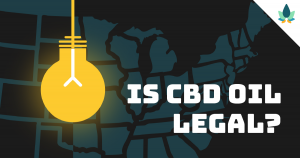Irritable Bowel Syndrome is exactly what it sounds like…irritating.
Sometimes it’s even debilitating. A common disorder that affects the large intestine, irritable bowel syndrome (better known as IBS), is a chronic condition that must be managed long term.
However, through the natural properties of cannabidiol, relief from the symptoms of IBS may be closer than you’d think.

For over 30 million people in the United States and over 10% of the global population, managing IBS is a daily struggle. The impact can be life-altering – causing changes in bowel movements and interfering with an individual’s overall wellbeing, from emotions to social engagements. (1)
IBS is unpredictable. Symptoms can often mirror other digestive problems and may contradict each other. Sufferers of IBS may experience:
- Diarrhea
- Constipation
- Abdominal pain
- Cramping
- Bloating
- Excess gas
- Mucus present in the stool
- Persistent pain
While there are treatments available to help manage IBS, not all treatments work for all people and many do not seek medical care for their symptoms.
Some people can control their symptoms simply by managing diet, lifestyle, and stress. Others require medication.
For IBS that is triggered by stress or hormones, the properties of CBD may be a helpful solution. CBD’s natural anti-inflammatory qualities make it effective in regulating the body, managing infections, and balancing the nervous system.
CBD, also known as cannabidiol, is non-psychoactive, which means it won’t make you feel “high” like it’s better known counterpart, THC. CBD interacts with the body’s endocannabinoid system to help the body maintain homeostasis.
How Does CBD Help IBS?
We’ve learned that IBS is unpredictable and that the symptoms are a result of inflammation in the intestines and digestive tract. We also know that CBD is a natural antioxidant and anti-inflammatory.
The key here is the connection between the endocannabinoid system and the intestines. The endocannabinoid system is best thought of as a bridge between the mind and body. Found in all mammals, this system contains receptors that respond to cannabinoids, like CBD. It promotes balance throughout the body. (2)
In the mid-2000s, a study found a link between IBS and deficiencies in the endocannabinoid system. When CBD was used, IBS sufferers saw their symptoms significantly improve. Other studies have shown similar results: (3)
- A 2007 study found that cannabinoids significantly impact the endocannabinoid system and its receptors, suggesting that it’s effective in helping inflammatory diseases. (4)
- A 2011 study showed that CBD could help inflammation in the gut by controlling glial cells in the central nervous system which respond to the nervous and immune systems in the intestines. (5)
- A 2013 review highlighted the promising benefits of CBD as therapy for inflamed bowels. (6)

Simply put, CBD stimulates the human body to relieve symptoms and regenerate as needed.
CBD suppresses pain, another common side effect of IBS, by targeting the glycine receptors in the body. As CBD interacts with these receptors, pain is reduced. Think of it as traditional pain management medications without the traditional side effects. (7)
Using CBD systematically and consistently allows the brain to interact and offset the pain and other imbalances. If you like the science behind it, dive deeper with the findings of these studies. (8)

CBD And Leaky Gut
Beyond IBS, CBD has shown multiple benefits for digestion as a whole, especially as it relates to Leaky Gut syndrome.
While the main purpose of the digestive system is to provide nutrients to the rest of the body, science and research have recently uncovered that the gut is responsible for far more.
Home to what medical professionals and researchers call the “microbiome,” the gut houses trillions of organisms that work together for ultimate health.
Ranging from bacteria and fungi to protozoa and more, these organisms require a balance to keep the whole body in the highest state of health possible. Feeding these organisms using compounds like probiotics have recently gained attention.
Organisms in the gut can help keep the immune system functioning at its highest level, help the body use the nutrients provided by the food we consume, and more. They’re even linked to mental health and performance; those with certain disorders – like PTSD – have been demonstrated to have lower levels of certain organisms in the gut.
Because the endocannabinoid system aids in digestion, inflammation and overall balance within the body, it’s promising to think that it may help balance the microbiome in the gut, reducing the symptoms of the leaky gut syndrome and leading to better overall health.
CBD: Beyond IBS
The benefits of CBD go far beyond treating IBS. It can be used to treat many secondary problems that cause discomfort – symptoms such as nausea, pain, anxiety, and more.

Nausea
is a symptom that can be caused by a myriad of problems – including IBS. Many treatments for nausea are meant for specific causes, like motion sickness, migraines, or others. CBD helps the receptors in the endocannabinoid system regulate nausea’s common triggers.
Anxiety
can be debilitating on its own. Thankfully, CBD is able to promote balance throughout the entire body by interacting with receptors in the brain that are directly linked to anxiety-induced behavior and emotions such as fear. It’s a promising option in regulating mood and anxiety while also easing the physical discomforts of IBS. (9)You guessed it, the endocannabinoid system is also a key player in responding to muscle spasms. In this case, a topical or oral treatment may be most effective in reducing muscle spasms. CBD targets the receptors that control the way we react to pain and reduces the sensation without inducing many side effects.
How Do I Use CBD?
CBD comes in a few different forms. It can be placed under the tongue as a tincture, consumed as a capsule, used as a topical cream, consumed as an edible, or even vaped. However you decide to use CBD, it’s important to start at a low concentration and build up until you find the right quantity to reduce your symptoms.
Anything we put in our bodies can cause side effects. However, the side effects of CBD – such as fatigue and appetite changes – are so minimal that many people choose to accept them as an escape from traditional medicine.
While IBS can be difficult to treat with traditional treatments, CBD is becoming a front-running alternative that provides relief and brings balance to the body. What are you waiting for? Give it a try!







